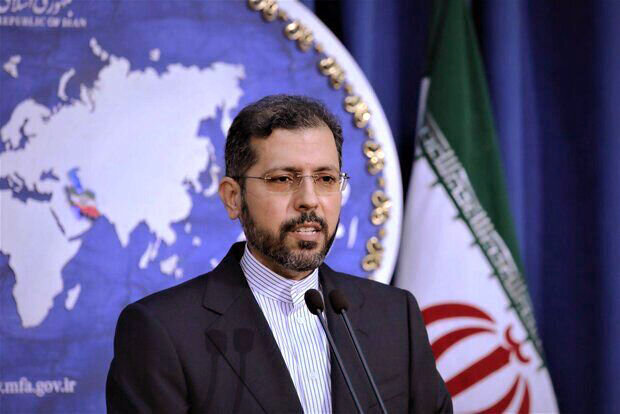Iran calls on Afghans to avoid violence, fratricide

TEHRAN – Iranian Foreign Ministry spokesman Saeed Khatibzadeh has called on the Afghans to avoid violence and resolve their differences through dialogue amid ongoing clashes in the Panjshir Valley between the Taliban and resistance groups led by Ahamd Massoud.
Referring to the sporadic clashes in Panjshir, Afghanistan, the Foreign Ministry spokesman called on all parties to show restraint and adhere to the principle of dialogue to resolve disputes, and called on Afghan groups to refrain from resorting to violence and fratricide, according to Iran’s state news agency IRNA.
In an interview with IRNA on Friday about the current developments in Afghanistan and the sporadic clashes in Panjshir, Khatibzadeh called on all parties to show restraint and adhere to the principle of dialogue to resolve disputes and reach a mutually acceptable solution.
The spokesman underlined, “The Islamic Republic of Iran is in constant contact with all parties and has made every effort to reduce the suffering of the Afghan people to a minimum. We believe that lasting peace and stability in Afghanistan can only be achieved through genuine intra-Afghan dialogue without the presence and intervention of foreign countries.”
Khatibzadeh said: “Afghanistan today is tired of years of occupation and war and violence, and therefore all groups must avoid the re-use of violence and fratricide.”
Condemning any foreign interference, he noted, “The people of Afghanistan deserve a popular and inclusive government that reflects the demographic and ethnic composition of this country.”
Khatibzadeh stated, “The Islamic Republic of Iran is with the people of Afghanistan in this direction, as it has been for the last 40 years.”
Ahmad Masoud, the son of the late anti-Soviet Mujahideen commander Ahmad Shah Masoud, has established himself in Panjshir Valley, leading a several-thousand-strong force comprised of militias and remnants of the Afghan army and special forces units who are opposed to the Taliban, according to Press TV.
Panjshir has been the only region to hold out against the Taliban following their takeover of Afghanistan.
Masoud has called for a negotiated settlement with the Taliban but has said his forces will resist if the narrow and mountainous valley is attacked.
The Taliban are poised to run Afghanistan again 20 years after they were removed from power by invading American forces. Press TV reported that the Taliban militants intensified their offensives and rapidly overran major cities in recent weeks as the United States started what was seen as a hasty withdrawal of its forces from Afghanistan. The Taliban took control of Afghanistan on August 15, prompting the evacuation of thousands of Afghans and foreign civilians via the Kabul airport, while foreign troops also used the airfield to pull out.
Iran has long called for two things in Afghanistan: the formation of an inclusive government and the end of foreign meddling in the war-torn country.
Iran’s special envoy for Afghanistan Mohammad Ali Taherian underlined these principles in a recent meeting with his German counterpart Jasper Wieck.
Taherian underlined the need for all sides to stick by a political solution to the Afghanistan conflict and make efforts to form an inclusive and pluralistic government as the only option for ending war and violence there.
Jasper Wieck supported the approach and called for continued consultations and cooperation between Iran and Germany to establish lasting peace and stability with the participation of all ethnic groups and factions in Afghanistan.
Last week, Khatibzadeh said Iran seeks establishment of an “inclusive” government in Afghanistan, and is ready to facilitate intra-Afghan talks.
“We have always stood by the people of Afghanistan and our priority has been to ensure peace, stability and progress in Afghanistan. Afghanistan is our dear neighbor. It is in our realm of civilization, and a statement I read at the ministry last week emphasized that the lives, honor, and properties of the Afghan people must be respected by all groups in the country. What we think will bring peace and stability to Afghanistan is the formation of an inclusive government in this country that reflects the ethnic and demographic composition of Afghanistan,” he noted.
Khatibzadeh added, “In this regard, the responsibility of the future government of Afghanistan will help fulfill their definite obligations, and we are waiting to see the formation of an inclusive government and the commitment of that government to fulfill its responsibilities, and based on that, Iran and the international community will make their decisions.”
The spokesman said that what Iran seeks is that Afghans decide for their future.
“What is clear from the statement issued by the Ministry of Foreign Affairs, which I have read before, is that we seek the people of Afghanistan to decide their own destiny, and no force outside Afghanistan can decide for the people of Afghanistan and their future. Afghanistan should be allowed to create an inclusive government in the country by facilitating inter-Afghan dialogue, not a minority government against the majority or a government with only one group, but a government that reflects the demographic and ethnic composition of Afghanistan,” he elaborated.
Leave a Comment